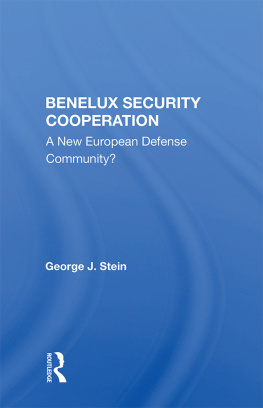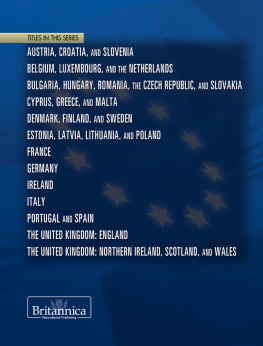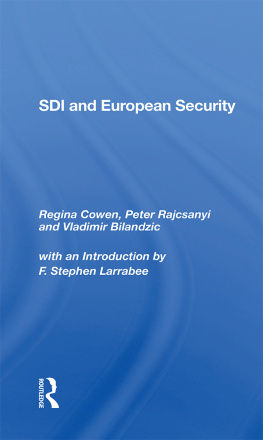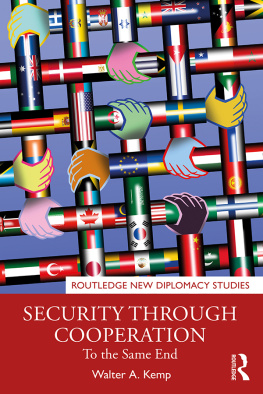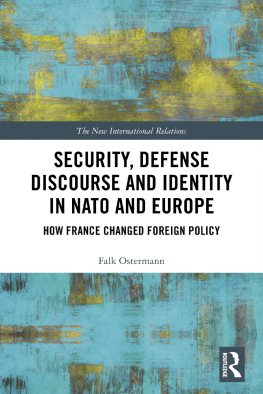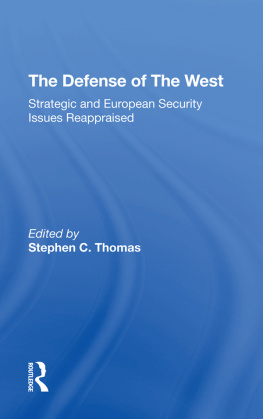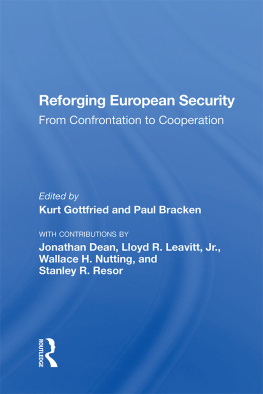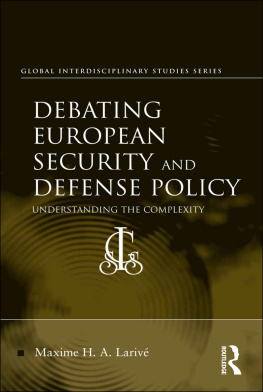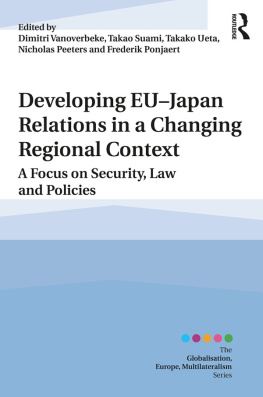Studies in Global Security
Alan Ned Sabrosky, Series Editor
Benelux Security Cooperation: A New European Defense Community? George J. Stein
Restive Partners: Washington and Bonn Diverge, W. R. Smyser
Defense and Dtente: U.S. and West German Perspectives on Defense Policy, Joseph I. Coffey and Klaus von Schubert
The U.S.-Canada Security Relationship: The Politics, Strategy, and Technology of Defense, edited by David G. Haglund and Joel J. Sokolsky
Security in Northeast Asia: Approaching the Pacific Century, edited by Stephen P. Gibert
Alliances in U.S. Foreign Policy: Issues in the Quest for Collective Defense, edited by Alan Ned Sabrosky
First published 1990 by Westview Press, Inc.
Published 2018 by Routledge
52 Vanderbilt Avenue, New York, NY 10017
2 Park Square, Milton Park, Abingdon, Oxon OX14 4RN
Routledge is an imprint of the Taylor & Francis Group, an informa business
Copyright 1990 Taylor & Francis
All rights reserved. No part of this book may be reprinted or reproduced or utilised in any form or by any electronic, mechanical, or other means, now known or hereafter invented, including photocopying and recording, or in any information storage or retrieval system, without permission in writing from the publishers.
Notice:
Product or corporate names may be trademarks or registered trademarks, and are used only for identification and explanation without intent to infringe.
Library of Congress Cataloging-in-Publication Data
Stein, George J.
Benelux security cooperation: a new European defense community?/
George J. Stein.
p. cm.(Studies in global security)
Includes bibliographical references.
ISBN 0-8133-7962-8
1. Benelux countriesMilitary relations. 2. Benelux countries
Military policy. 3. EuropeMilitary relations. 4. Europe
Defenses. 5. North Atlantic Treaty Organization. I. Title.
UA680.S74 1990
355'.0335'09492dc20 89-21506
CIP
ISBN 13: 978-0-367-01454-4 (hbk)
Since the end of the Second World War, the three Benelux nations, Belgium, the Netherlands, and Luxembourg, have been among the most active participants in the European unity movement. Indeed, in 1944, even before the end of hostilities, the three nations indicated their commitment to European unity with the establishment of the Benelux Customs Union. This Benelux Customs Union formed the foundation and model of the original European Economic Community when, in 1958, the three Benelux nations were joined by France, Italy, and West Germany to continue the evolution of a united Europe. And, although the three nations had very distinctive national security policies prior to the Second World War, again wartime cooperation prompted them to act in a concerted manner in the post-war years. Even before the establishment of NATO in 1949, the three nations had, collectively, rejected Franco-British proposals for a "traditional" set of bilateral security arrangements. Belgium and the Netherlands, again before the establishment of NATO, had signed a Military Cooperation Accord to develop common Benelux security positions and increasing integration.
Belgium, the Netherlands, and Luxembourg are, however, among the smaller European members of the European Community and NATO. While their vision of a united Europe moves ever closer to realization in the European Community, their small power status within NATO has meant, usually, that they followed the security agenda established by the United States. With the rapidly changing security environment within NATO as represented by the recently negotiated INF Treaty, the Mutual and Balanced Force Reduction negotiations in Vienna and the continuing debates on short-range nuclear weapons modernization, Follow-on Forces Attack, burden sharing, and conventional defense, the three Benelux nations have the opportunity to recapture their leadership in the European unity movement in the field of European security and defense. An indication of this renewed Benelux interest in a common approach to security policies was the conference sponsored by the Royal Netherlands Army Association "Ons Leger" in 1987, which brought together political and military representatives from all three nations to examine the development of a "European" Armed Forces, beginning with the Benelux Armed Forces. Can the Benelux Armed Forces be united to form, as did the Benelux Customs Union, the foundation of a new European Defense Community as a genuine European pillar of the North Atlantic Alliance? Again, while all three Benelux nations resist any "expansion" of NATO beyond Europe-that is, they rejected the request by the United States to send a NATO naval squadron to the Persian Gulf - all three did send help under the auspices of the Western European Union: Belgium and the Netherlands sent ships and Luxembourg contributed funds to the WEU effort. That is, the three Benelux nations mounted a genuine collective and "European" response.
This book is an exploration of the security and defense policies of Belgium, the Netherlands, and Luxembourg with the specific goal of discovering opportunities for greater Benelux security cooperation which, within the context of the North Atlantic Alliance, could serve as the foundation of a European Defense Community. then, represents specific proposals for security and defense reform within the context of Benelux military cooperation and the institutional framework of the Benelux Military Accord which could produce a Benelux Force posture as the core of a European Defense Community.
It is a sound academic custom that the author take full responsibility for errors in fact and judgment when acknowledging the assistance of others in the preparation of a manuscript. In this case, where many of the observations concerning the Benelux armed forces are quite critical and many of the proposals for reform will be perceived as controversial, the author's personal responsibility must be especially stressed. Many serving officers in the Benelux armed services and sitting politicians in all three nations were very generous with their time and forthright with information and advice during the extensive series of interviews which served as background for this book. While their assistance is gratefully acknowledged, none would be prepared to identify fully with all the critical comments or reform proposals advanced.
I wish to thank Maj. Gen. L.P. van Oppen (retd.), Past-president of the Netherlands Army Association; HA. Kamman, J.P.T.M. Jaspers, and LTC G. Struijker of the Netherlands Ministry of Defense; the Honorable H.A. van Mierlo, former Minister of Defense; and Dr. T.B.F.M. Brinkel, Wetenschappelijk Instituut of the Christian Democratic Party; P. Werner, former Prime Minister of Luxembourg; and Jean-Jacques Kasel, Joseph Berg, and Armand Clesse of the Ministries of Foreign Affairs and the Force Publique ; Maj. Gen. R. Close, Director, Institut Europen pour la Paix et la Scurit, Maj. Gen. R. Bats, Commandant, Royal Higher Institute for Defense, Professors P. Stouthuysen and G. Geeraerts, Centrum voor Polemologie, Free University of Brussels, and Professor Luc Reychler of the Center for Strategic Studies, Catholic University of Leuven. I especially wish to thank Professor Peter Volten of the University of Utrecht for his willingness to assist a fellow academic with encouragement, critical comments, and challenging ideas on Benelux military reform. Many of the best ideas emerged from our conversations and, hopefully, many mistakes were avoided. Again, errors of fact and judgment are the responsibility of the author.

